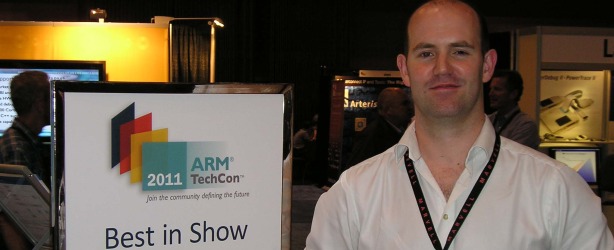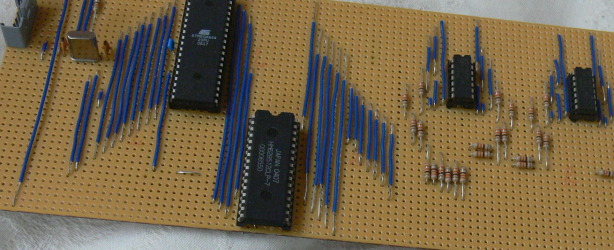Raspberry Pi: the modder's dream machine?
January 26, 2012 | 08:25
Companies: #arm #broadcom #raspberry-pi

Few computing projects in recent memory have caused such a stir as the Raspberry Pi, but from where did this tastily-named device - a fully functional ARM-based computer costing as little as $25 - spring? We talk to project founder Eben Upton to find out what’s behind this British charitable venture.
It's a project to make a very cheap computer,’ Upton explained by way of background, ‘to make a computer for $25 without networking or $35 with. It was founded because we think that the lack of programmable hardware for children - the sort of hardware we used to have in the 1980s - is undermining the supply of eighteen year olds who know how to program, so that's a problem for universities, and then it's undermining the supply of 21 year olds who know how to program, and that's causing problems for industry.’
‘We,’ in this case, is a team of engineers, academics, coders and hackers led by Upton and Frontier Developments head David Braben; a man perhaps better known for his work on seminal 80s space sim Elite - for many an early introduction into just what’s possible from a home computer, with its three-dimensional graphics and epic scale - and its sequels.
It’s a project with a long history: as far back as 2006 Upton was using the experience he gained at his day job as an engineer for system-on-chip specialist Broadcom to develop a Veroboard-based prototype with a Atmel ATMega644 microcontroller running at just 22.1MHz and with 512K of RAM.
While microcontrollers are fine for prototyping projects like the Arduino and its clones, and even for simple microcomputers like the eight-bit kit-based FIGnition developed by Julian Skidmore, Upton and colleagues had something a little more powerful in mind. ‘In the end,’ Upton wrote of his original prototype, ‘I felt that much higher performance, and the ability to run a general-purpose operating system, outweighed the benefits of home assembly.’.
With the aid of components helpfully provided by Upton’s employer Broadcom, the pair founded a charitable entity with a noble goal: to build computing devices at such a low cost that every child could afford one, potentially making a massive difference to the teaching of computing both in the UK - as recently castigated by education secretary Michael Gove - and throughout the world.
Although Upton’s original goal of making it a purely British endeavour has been scuppered, thanks to complicated tax laws on the importation of components and ‘simply the cost of building stuff in the UK,’ which Upton explained has led to the initial boards being manufactured overseas in a Chinese factory, the project’s charitable nature remains.
It's a project to make a very cheap computer,’ Upton explained by way of background, ‘to make a computer for $25 without networking or $35 with. It was founded because we think that the lack of programmable hardware for children - the sort of hardware we used to have in the 1980s - is undermining the supply of eighteen year olds who know how to program, so that's a problem for universities, and then it's undermining the supply of 21 year olds who know how to program, and that's causing problems for industry.’
‘We,’ in this case, is a team of engineers, academics, coders and hackers led by Upton and Frontier Developments head David Braben; a man perhaps better known for his work on seminal 80s space sim Elite - for many an early introduction into just what’s possible from a home computer, with its three-dimensional graphics and epic scale - and its sequels.
It’s a project with a long history: as far back as 2006 Upton was using the experience he gained at his day job as an engineer for system-on-chip specialist Broadcom to develop a Veroboard-based prototype with a Atmel ATMega644 microcontroller running at just 22.1MHz and with 512K of RAM.
While microcontrollers are fine for prototyping projects like the Arduino and its clones, and even for simple microcomputers like the eight-bit kit-based FIGnition developed by Julian Skidmore, Upton and colleagues had something a little more powerful in mind. ‘In the end,’ Upton wrote of his original prototype, ‘I felt that much higher performance, and the ability to run a general-purpose operating system, outweighed the benefits of home assembly.’.
With the aid of components helpfully provided by Upton’s employer Broadcom, the pair founded a charitable entity with a noble goal: to build computing devices at such a low cost that every child could afford one, potentially making a massive difference to the teaching of computing both in the UK - as recently castigated by education secretary Michael Gove - and throughout the world.
Although Upton’s original goal of making it a purely British endeavour has been scuppered, thanks to complicated tax laws on the importation of components and ‘simply the cost of building stuff in the UK,’ which Upton explained has led to the initial boards being manufactured overseas in a Chinese factory, the project’s charitable nature remains.

MSI MPG Velox 100R Chassis Review
October 14 2021 | 15:04










Want to comment? Please log in.